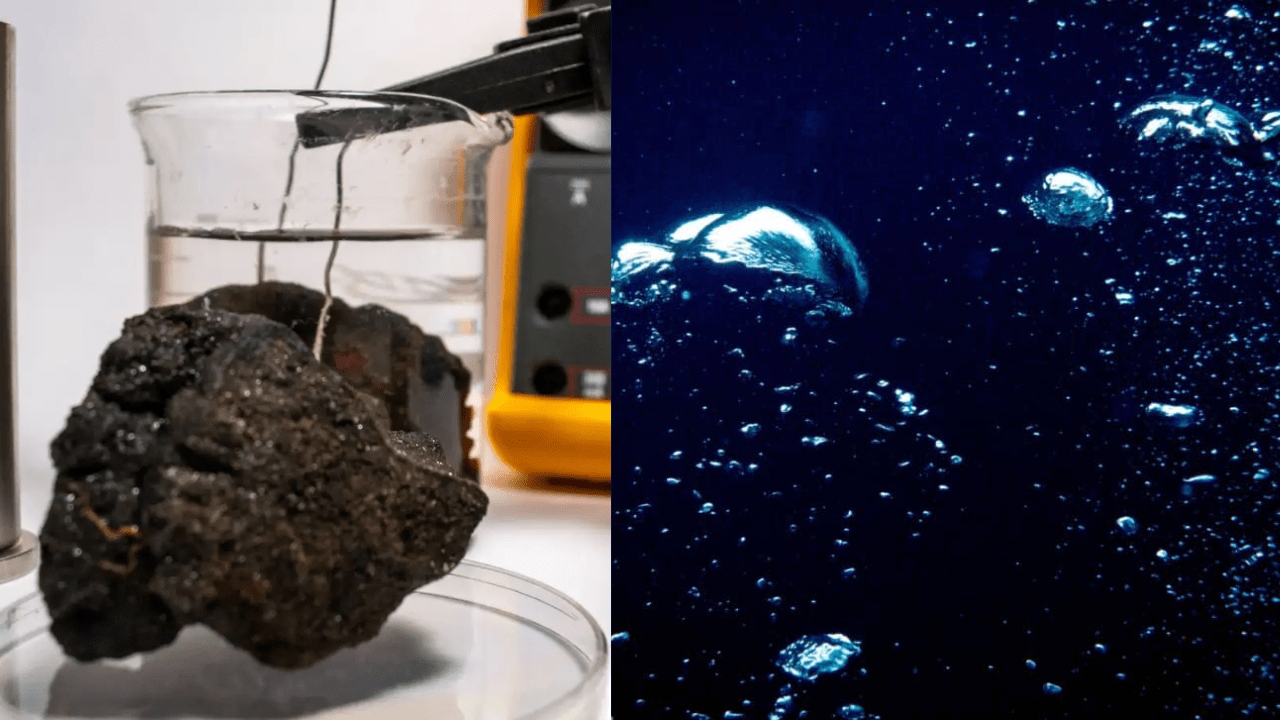Discover the groundbreaking discovery of ‘dark oxygen’ in the depths of the Pacific Ocean. Learn how polymetallic nodules, rich in metals, generate oxygen without sunlight, prompting a rethink on the origins of life. Explore the implications of this finding and its potential impact on future scientific research!

The depths of the Pacific Ocean have long been a subject of intrigue and mystery for scientists. Recently, a groundbreaking discovery has added to the allure of this dark, unexplored world. Researchers have found that oxygen is being produced not by living organisms, but by strange, potato-shaped metallic lumps known as polymetallic nodules. This phenomenon, dubbed ‘dark oxygen,’ could force a major rethink about the origins of life on Earth.
Dark Oxygen: The Unlikely Source of Oxygen
Traditionally, it has been believed that oxygen production is a process exclusive to living organisms such as plants and algae, which use sunlight to perform photosynthesis. However, at depths of four kilometers (2.5 miles) below the surface of the Pacific Ocean, where sunlight cannot penetrate, this long-held belief has been challenged. In the Clarion-Clipperton Zone (CCZ), an abyssal plain stretching between Hawaii and Mexico, scientists have recorded polymetallic nodules producing oxygen without any biological or light-dependent processes.
What are Polymetallic Nodules?
Polymetallic nodules are small mineral deposits found on the seafloor. These nodules are rich in valuable metals such as cobalt, nickel, copper, and manganese. These metals are crucial for modern technology, being essential components in batteries, smartphones, wind turbines, and solar panels. These nodules have often been referred to as “batteries in a rock” due to their electrical properties.
The Discovery Process
An international team of scientists aimed to understand how mining these nodules could impact the deep-sea ecosystem. They sent a small vessel to the seafloor of the CCZ and used a device called a benthic chamber to measure the rate of oxygen consumption by the sediment. Typically, oxygen levels in such a chamber decrease over time as organisms consume it. However, in this case, the opposite occurred – the amount of oxygen increased.
The Shocking Revelation
The initial results were so unexpected that the researchers thought their sensors might be malfunctioning. To verify their findings, they brought some nodules back to their ship and repeated the test. Once again, the oxygen levels increased, confirming the initial discovery. Further experiments in the lab revealed that these nodules generate electric currents strong enough to split seawater molecules, producing oxygen in the process.
Implications for the Origins of Life
This discovery of ‘dark oxygen’ production has profound implications for our understanding of life’s origins. The presence of oxygen-producing mechanisms that do not rely on sunlight or biological processes suggests that oxygen-rich environments could potentially exist in similar conditions elsewhere in the universe. This could mean that life might thrive in environments previously thought to be uninhabitable, such as on other moons and planets.

Potential for Extraterrestrial Life
The finding raises the possibility that similar processes could be occurring on other celestial bodies, creating oxygen-rich environments where life could develop. This could significantly broaden the scope of astrobiological research and the search for extraterrestrial life. If battery-powered oxygen production is happening in the depths of our oceans, it could also be happening in the sub-surface oceans of moons like Europa or Enceladus.
Mining and Environmental Concerns
While the discovery is exciting, it also raises concerns about the potential impact of deep-sea mining. The CCZ, where these nodules are found, is a target for mining companies due to the valuable metals they contain. Understanding the ecological role of these nodules and the potential consequences of disturbing them is crucial. The production of ‘dark oxygen’ adds another layer of complexity to the environmental considerations of deep-sea mining.
Future Research Directions
The discovery of ‘dark oxygen’ opens up new avenues for research. Scientists will need to further investigate the mechanisms behind this oxygen production and explore its prevalence in other parts of the ocean. Additionally, understanding how this process affects deep-sea ecosystems and how it might be replicated or utilized on other planets will be key areas of focus.
In Short
The discovery of ‘dark oxygen’ production in the depths of the Pacific Ocean is a significant scientific breakthrough. It challenges our understanding of oxygen production and the origins of life, suggesting that life-sustaining environments might be more common than previously thought. As research continues, this finding could reshape our approach to both deep-sea exploration and the search for extraterrestrial life, highlighting the interconnectedness of Earth’s mysteries and the broader cosmos.
Read Next:

The Psychology of Love: Why Valentines Day Matters More Epic Than You Think
Discover the psychology of love and why Valentines Day is more important than you think. Learn how love impacts the brain, strengthens relationships, and boosts

Premier League Highlights: Arsenal Humiliate Man City 5-1, Spurs and Palace Secure Crucial Wins
Arsenal demolished Manchester City 5-1 in a statement premier league highlights win, reigniting their title hopes. Meanwhile, Crystal Palace stunned Man United 2-0, and Tottenham

How Budget 2025 Impacts the Indian Middle-Class: Major Tax Benefits and Glaring Omissions
Budget 2025 offers major tax relief to the middle class, including zero tax on incomes up to ₹12 lakh. However, it misses out on incentives

Degrees vs Employability: Why “Highly Qualified Degree Holders” Struggle to Find Jobs While “Less Qualified Individuals” Get Hired Faster!
Many highly qualified individuals struggle to secure jobs, while less qualified candidates get hired quickly. This Degrees vs Employability paradox is caused by employer preferences,

The Power of Mindset: Why Looking Poor Doesn’t Make You Poor, but Thinking Poor Does!
Discover why looking poor doesn’t define your wealth but thinking poor does. Learn the power of mindset and how a growth-oriented mindset can lead to

Overthinking: How It’s Damaging Today’s Youth – Causes and Cure in 2025
Understanding how overthinking is silently damaging today’s youth, from its causes rooted in societal pressure and social media to its long-term effects on mental health.
